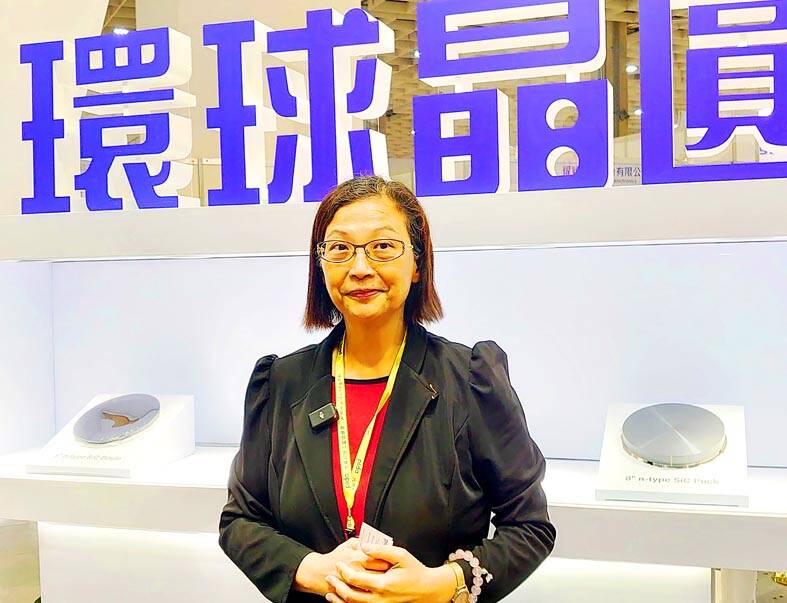GlobalWafers Co (環球晶圓), the world’s third-largest silicon wafer supplier, yesterday said it is to receive US$406 million in subsidies from the US Department of Commerce for two new US fabs under the CHIPS and Science Act, with the first batch of the funds likely coming next year.
The grant represents 10 percent of the planned investments of US$4 billion in advanced semiconductor wafer manufacturing facilities in Texas and Missouri, GlobalWafers said.
The commerce department is to disburse the funds based on the completion of project milestones over a multiyear timeframe, the company said.

Photo: CNA
Along with the tax credit, which is equal to 25 percent of the qualified investment, the total government funding would make up 35 percent of GlobalWafers’ investments in the US, it said.
The company plans to build a new 12-inch silicon facility in Sherman, Texas, and a new 12-inch silicon on insulator (SOI) wafer plant in St Peters, Missouri, via its subsidiaries GlobalWafers America and MEMC LLC.
GlobalWafers said that it has received orders that would take up 80 percent and 90 percent of the capacities of the Texas and Missouri fabs respectively.
Starting in the first half of next year, GlobalWafers America would become the first high-volume advanced 12-inch silicon wafer facility in the US, the company said.
MEMC is also slated to start manufacture 12-inch silicon-on-insulator wafers in the first half of next year, it added.
“As we plan to achieve the first milestone in the first half of next year, we have an opportunity to receive the first CHIPS Act funding by the end of next year, if everything progresses smoothly,” GlobalWafers chairwoman Doris Hsu (徐秀蘭) told a virtual media briefing yesterday.
The US government funding would “greatly help” mitigate the company’s financial pressure and drive down the depreciation costs of the new facilities and manufacturing equipment, Hsu said.
GlobalWafers is facing mounting financial pressure with its capital expenditures and depreciation costs forecast to peak this year and next year, she said.
The company expects to see a significant improvement in gross margins in 2026 versus next year, as well as a better equipment loading rate and relatively healthier inventory on the semiconductor market, Hsu said.
Amid growing concern that US president-elect Donald Trump could scrap the CHIPS Act when he takes office next month, GlobalWafers said it believes the US government would uphold the law and that no major changes would occur as Washington has a good track record of living up to its promises.
With the new advanced wafer factories in the US, GlobalWafers said it would have a competitive edge over its rivals, given no tariffs, shorter-distance transportation costs and low carbon emissions.
“Our target is to have our wafers certified at all silicon wafer consumers in the US,” Hsu said.
“Starting next year and for the first time in over 20 years, the US will again be home to advanced wafers for leading-edge integrated circuits. Our new facilities will fill a key vulnerability in the US supply chain and bring back to American shores the technology that was pioneered here over 60 years ago,” GlobalWafers president Mark England said in a statement yesterday.
“As the only global wafer manufacturer participating in the CHIPS for America Program, we are fully committed to supporting the nation’s semiconductor manufacturing rebirth,” he said.

The number of Taiwanese working in the US rose to a record high of 137,000 last year, driven largely by Taiwan Semiconductor Manufacturing Co’s (TSMC, 台積電) rapid overseas expansion, according to government data released yesterday. A total of 666,000 Taiwanese nationals were employed abroad last year, an increase of 45,000 from 2023 and the highest level since the COVID-19 pandemic, data from the Directorate-General of Budget, Accounting and Statistics (DGBAS) showed. Overseas employment had steadily increased between 2009 and 2019, peaking at 739,000, before plunging to 319,000 in 2021 amid US-China trade tensions, global supply chain shifts, reshoring by Taiwanese companies and

Shiina Ito has had fewer Chinese customers at her Tokyo jewelry shop since Beijing issued a travel warning in the wake of a diplomatic spat, but she said she was not concerned. A souring of Tokyo-Beijing relations this month, following remarks by Japanese Prime Minister Sanae Takaichi about Taiwan, has fueled concerns about the impact on the ritzy boutiques, noodle joints and hotels where holidaymakers spend their cash. However, businesses in Tokyo largely shrugged off any anxiety. “Since there are fewer Chinese customers, it’s become a bit easier for Japanese shoppers to visit, so our sales haven’t really dropped,” Ito

Taiwan Semiconductor Manufacturing Co (TSMC, 台積電) received about NT$147 billion (US$4.71 billion) in subsidies from the US, Japanese, German and Chinese governments over the past two years for its global expansion. Financial data compiled by the world’s largest contract chipmaker showed the company secured NT$4.77 billion in subsidies from the governments in the third quarter, bringing the total for the first three quarters of the year to about NT$71.9 billion. Along with the NT$75.16 billion in financial aid TSMC received last year, the chipmaker obtained NT$147 billion in subsidies in almost two years, the data showed. The subsidies received by its subsidiaries —

OUTLOOK: Pat Gelsinger said he did not expect the heavy AI infrastructure investments by the major cloud service providers to cause an AI bubble to burst soon Building a resilient energy supply chain is crucial for Taiwan to develop artificial intelligence (AI) technology and grow its economy, former Intel Corp chief executive officer Pat Gelsinger said yesterday. Gelsinger, now a general partner at the US venture capital firm Playground Global LLC, was asked at a news conference in Taipei about his views on Taiwan’s hardware development and growing concern over an AI bubble. “Today, the greatest issue in Taiwan isn’t even in the software or in architecture. It is energy,” Gelsinger said. “You are not in the position to have a resilient energy supply chain, and that,